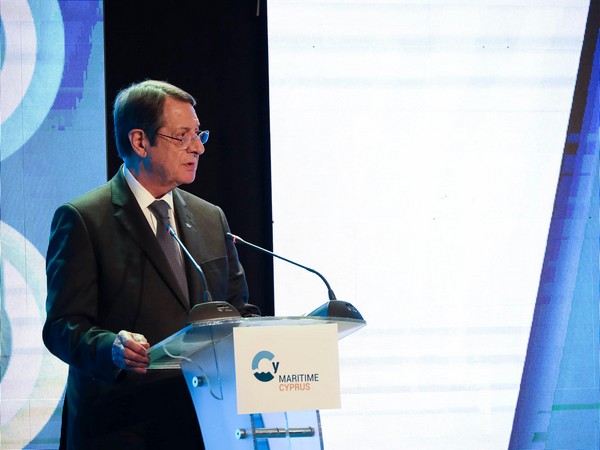Press Releases

10-10-2022 10:58
Address by the President of the Republic, Mr Nicos Anastasiades, at the “Maritime Cyprus 2022” Conference
It is both a great honor and a privilege to address the opening of the Maritime Cyprus Conference.
At the outset, I would like to express my sincere appreciation to the Organizers of the event: the Deputy Ministry of Shipping, the Cyprus Shipping Chamber and the Cyprus Union of Shipowners.
At the same time, I also wish to extend a warm welcome to all of you, and in particular the renowned delegates of the international maritime and shipping industry.
Your massive presence validates, yet again, that Maritime Cyprus which was held for the first time in 1989 has grown into a Conference of international prestige and recognition, providing a forum in which hundreds of eminent executives and personalities of the maritime industry exchange views on specialized issues of interest and concern of the global shipping industry.
It also provides the opportunity to the participants to become familiar with the strong maritime tradition of Cyprus and its dynamic maritime cluster.
Having referred to Cyprus’ shipping, I wish to stress that we feel very proud of our achievements, which have placed our small country in a privileged position on the world’s shipping map.
We have established a competitive and modern international shipping center, ranked highly globally both as regards ship registries and third-party ship-management.
In parallel, around 300 shipping companies are based in Cyprus covering the full range of shipping – related activities, whilst in the past decade we have witnessed a three-fold increase in the number of companies registered under our tonnage tax system, namely: from 95 to 285 at present.
Nonetheless, what I feel obliged to stress is that, despite its impressive achievements, Cyprus Shipping would have held an even higher international ranking if the illegal restrictive measures imposed by Turkey since 1987 were abolished.
The said restrictive measures, not only adversely affect our interests, but those of the European Union as well, since it prevents the application of fundamental rights and free competition in maritime trade with the European Union.
Not to mention that they constitute a conventional obligation of Turkey vis-á-vis the European Union.
Recognizing the importance of shipping, its invaluable contribution to our economy and its dynamic potential, in 2018 we upgraded the maritime administration’s status from a department within a Ministry to a Deputy Ministry.
A decision aimed not only at establishing an organisational structure that could respond immediately and efficiently to unpredictable challenges, but would also allow, through reforms, digitalisation and minimising bureaucracy to further strengthen the attractiveness of an already thriving sector.
To this end, last October we launched a new long-term strategy for shipping, called: “SEA Change 2030”: A Strategy which contains 35 actions with a specific timeframe of implementation, categorized under three main pillars - Sustainable, Extrovert, and Adaptable- based on our vision for Cyprus to:
→ Further advance its role in the international shipping environment;
→ Enhance our attractiveness as a maritime center of sustainable growth and excellence;
→ Strengthen safety and security levels on Cyprus’ flag ships;
→ Provide rewards and incentives for “Greening” investments;
→ Intensify the presence of the Maritime Offices network of the Republic of Cyprus abroad, especially in the Far East; and, of course, to:
→ Upgrade the services provided by the Maritime Administration, so as to be able to provide a more flexible, effective and customer-oriented service.
To this end, we are in the process of establishing a one-stop-shipping centre framework, through:
(a) The establishment of the legal framework of the Maritime Entity; and,
(b) The digital transformation of the Shipping Deputy Ministry, which will optimize the Ministry’s business processes and maximize its operational efficiency.
Our policies are not only limited to strengthening the attractiveness of the Cyprus’ Registry and its relevant services, but are extended to a comprehensive and holistic development of our shipping cluster.
In this regard:
→ Recently we established an autonomous Admiralty Court, while we are in the process to finalising the legal and procedural framework for arbitration and mediation on maritime disputes.
→ We are providing green tax incentives to shipowners and operators, encouraging and supporting ships registered under the Cyprus registry to use alternative fuels, such as biofuels and hydrogen.
→ We are also offering funding tools and programs to encourage research and innovation, supporting the shipping industry to effectively respond to the digital and green transformation challenge.
To this end, we are also funding together with the EU, the Cyprus Marine and Maritime Institute: A Centre of Excellence in Marine and Maritime Research, Innovation, and Technology Development.
→ We have launched a number of campaigns and initiatives aiming to raise awareness to young generations of the career potentials and opportunities offered by the shipping sector.
As I have stated earlier, since the international geopolitical environment is fluid and unpredictable, we need to effectively respond to crises unfolding, such as the one we are currently facing following Russia’s invasion of Ukraine.
What I wish to convey in the strongest manner is that, being also victims of the Turkish invasion, we immediately and without hesitation agreed to the adoption of targeted sanctions vis-à-vis Russia in an effort to reverse its actions and return to dialogue.
I spoke of targeted sanctions, since their scope and aim should be:
On the one hand their impact should not become greater on EU member-states on specific vital sectors of our economies, rather than on Russia against which they are directed; and,
On the other hand, they should exclude the possibility of establishing conditions of unfair competition between EU member-states and third countries which could exploit gaps, inconsistencies or misinterpretations in specific provisions of the sanctions.
And these principles should be applied in all adopted sanctions, including, of course, European shipping which has a decisive role to play as regards the connection and seamless trade supply, not only of the European Union itself but globally.
That is why we remain firm in our position that maintaining to the maximum extent possible the competitiveness of European shipping flags remains of utmost importance.
As a maritime nation, we are fully aware that we are much stronger not on our own, but as part of dynamic and forward-looking collaborations.
That is why, asides being grateful to all of you for your presence, we fully appreciate the excellent co-operation we have established with the International Maritime Organisation, as well as with the EU, and we are honoured to have the IMO’s Secretary – General and the EU Commissioner for Transport with us today.
In this respect, I wish to assure you Mr Lim that Cyprus will continue to actively and constructively participate in the future evolution of the Organisation, including on implementing new strategies, such as improving maritime safety and environmental protection.
As I also wish to assure you Mrs Valean that Cyprus will continue its positive contribution in the formulation of the EU legislative framework in order to ensure that shipping is safe, environmentally sustainable, competitive, as well as an integral part to our efforts of achieving energy independence and carbon neutral economy.
I would like to once more thank you for your presence at the Maritime Cyprus Conference, particularly those who have joined us from abroad, and to wish for every success in the deliberations that are to follow the next days, which I have no doubt will prove to be fruitful and productive.
(RM/NG/IK)
Relevant Press Releases







